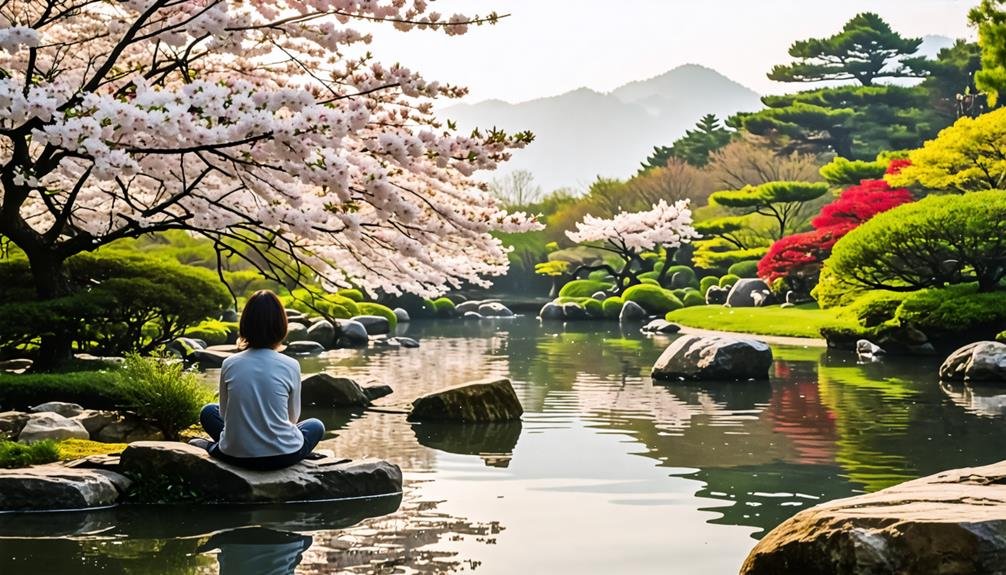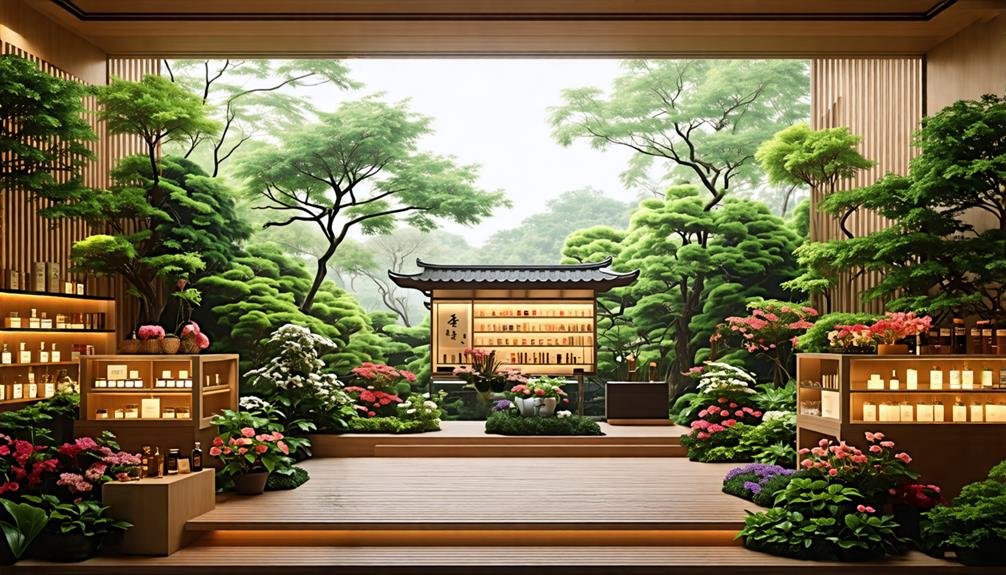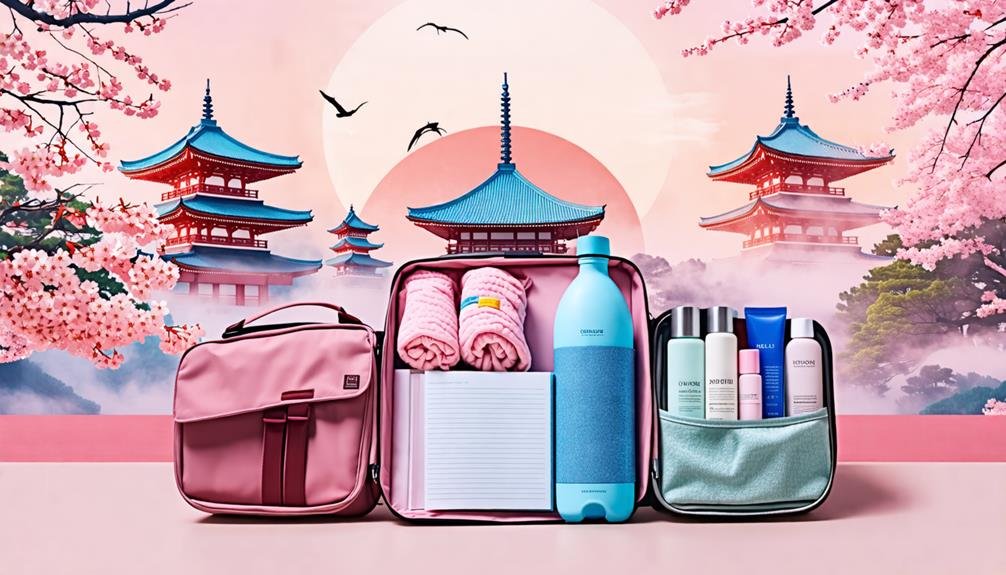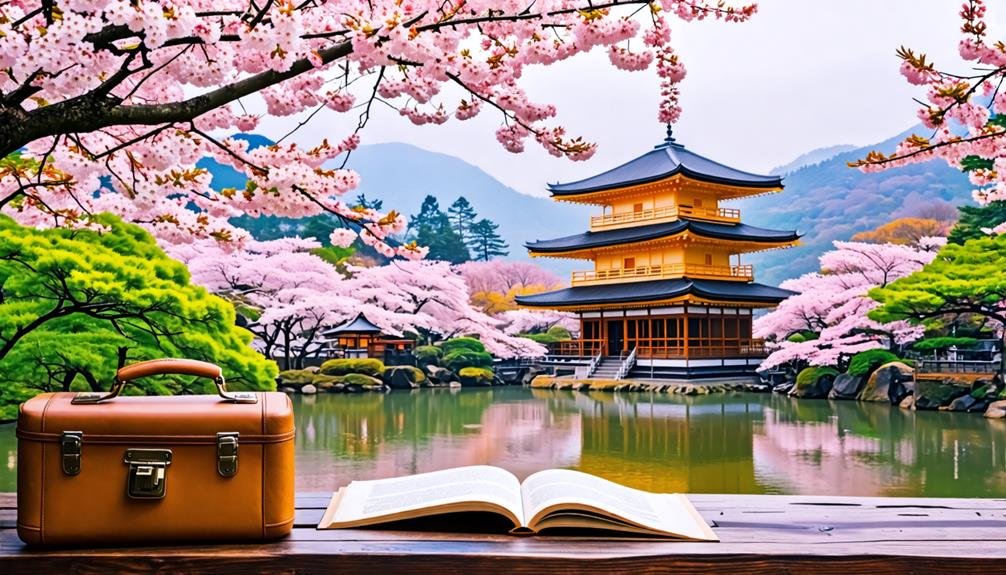Bringing potent perfume on a trip to Japan is inadvisable due to the cultural norm favoring subtlety in fragrances. In Japanese society, overpowering scents can be perceived as intrusive, impacting social interactions and dining experiences. Many establishments, particularly sushi restaurants, discourage strong fragrances, as they can overwhelm the delicate flavors of food. Instead of perfume, consider alternatives like essential oils, lightly scented lotions, or fragrance-free personal care products that respect local customs. By choosing lighter scents, or forgoing perfume altogether, travelers can foster a harmonious atmosphere and align with Japanese cultural sensitivities, enhancing their overall experience. Exploring further reveals more about suitable packing strategies.
Cultural Etiquette Around Fragrance
In Japan, the etiquette surrounding fragrances emphasizes subtlety. Strong perfumes, like those from brands such as Chanel or Dior, are often perceived as intrusive and disrespectful in social settings. For travelers, understanding this fragrance etiquette is crucial for graceful social interactions. Japanese travel tips often mention that the delicate balance of scents is key to maintaining harmony in public spaces.
Cultural customs in Japan prioritize consideration for others, extending to personal fragrance choices. The concept of 'smell harassment' or 'sumehara' highlights societal discomfort with overpowering scents. Consequently, selecting lighter fragrances or even choosing to forgo perfume altogether is advisable when engaging with locals or participating in communal experiences.
Travelers should also learn about local scent preferences, as the Japanese fragrance market often favors subtlety. In social environments, such as on trains or at gatherings, a faint scent may be acceptable, but strong perfumes can disrupt the collective atmosphere. By respecting these cultural nuances, visitors demonstrate consideration and enhance their experiences, fostering deeper connections in a society that values harmony.
Dining Experience and Scents
The dining experience in Japan greatly values the subtleties of aroma. Fragrances influence the enjoyment of meals, especially in Japanese cuisine, where scent contributes significantly to taste perception. A strong fragrance can overwhelm the delicate flavors that characterize traditional dishes.
Some sushi establishments, such as Sukiyabashi Jiro, have adopted no-fragrance policies. This practice helps preserve the authentic taste experience for diners. Additionally, the carefully curated ambient aromas within these restaurants enhance both the atmosphere and the flavors of the food served. This focus on scent creates a respectful and enjoyable dining environment.
To fully appreciate the culinary offerings in Japan, it is recommended to avoid strong perfumes and opt for lighter scents or no fragrance at all. This consideration fosters a harmonious setting that honors the craftsmanship of Japanese cuisine while allowing the natural aromas of the dishes to shine. Understanding and respecting fragrance etiquette can elevate your gastronomic journey in Japan.
Impact on Social Norms

In Japanese society, strong fragrances are often viewed negatively, showcasing a cultural sensitivity towards scent in shared environments. This disapproval is linked to the notion of 'smell harassment,' known as sumehara, which underscores the discomfort that overpowering aromas can provoke in others. The fragrance industry in Japan is relatively modest, indicating a collective preference for subtlety rather than boldness. Social customs dictate that individuals should be mindful of those around them, making the avoidance of intense perfumes a demonstration of respect.
In various public venues, like offices and trains, strong scents can be considered intrusive. This cultural norm encourages individuals to opt for lighter fragrances or to skip perfume altogether. Exceptions may occur in particular settings, such as upscale sushi establishments, where the environment permits a more lenient approach to aromas. Nonetheless, even in these situations, guests are generally expected to maintain moderation.
Understanding Scent Strength
In Japan, scent strength hierarchy affects fragrance use in social settings. Fragrances, like colognes and body mists, are light and subtle. These options allow individuals to express themselves without overwhelming others. Stronger perfumes, such as Chanel No. 5 or Dior Sauvage, contain higher concentrations of fragrance oils. These can be intrusive and often deemed inappropriate in close-knit or public environments.
This hierarchy is crucial for travelers to Japan, where cultural norms emphasize harmony and consideration for others. The concept of 'smell harassment' reflects the sensitivity surrounding scents in social interactions. Strong fragrances can disrupt the ambiance in shared spaces, like sushi restaurants or Tokyo subway trains.
For those wanting to express themselves through scent, lighter options are wise. Choosing brands like Jo Malone or Bath & Body Works shows respect for local customs. This considerate approach enhances the experience of enjoying Japan's rich cultural tapestry.
Strategies for Wearing Perfume

Travelers visiting Japan should prioritize lighter fragrance concentrations to align with local customs and sensitivities regarding scent use. Understanding the hierarchy of fragrance strength is essential in navigating this cultural landscape. Choosing lighter options, such as Eau de Toilette or body sprays from brands like Dolce & Gabbana or Marc Jacobs, ensures a more respectful experience in public spaces.
A practical technique involves applying fragrance to a cotton swab and gently dabbing it under your nose. This approach allows for a personal scent experience without imposing on others. Additionally, traveling with a friend who can provide feedback on fragrance intensity can help maintain awareness of social conventions.
For those who favor more intense fragrances, consider diluting the scent with rubbing alcohol or unscented lotions, such as those from Aveeno or Cetaphil, which can help tone down the aroma while still allowing for personal expression. By embracing these strategies, travelers can enjoy their selected fragrances while honoring the preferences of those around them. Ultimately, understanding the fragrance culture in Japan enhances the travel experience, fostering both personal expression and respect for local customs.
Scent and Taste Connection
The connection between scent and taste is an essential aspect of the dining experience, as odor constitutes approximately 80% of what we perceive as flavor. Strong perfumes can interfere with our scent receptors, ultimately altering the way food tastes and diminishing the enjoyment of culinary delights. Moreover, ambient scents in a dining environment can greatly influence both flavor perception and general mood, highlighting the importance of being mindful of fragrance choices, particularly in Japan.
Flavor Perception Alteration
Flavor perception closely connects to aroma. Research shows that scents significantly influence food tasting experiences. The interplay between our smell receptors and taste buds highlights the need for an inviting dining atmosphere, particularly in culinary-rich nations like Japan. Overpowering fragrances can overshadow subtle tastes, diminishing meal enjoyment.
Consider these points about flavor perception changes:
- Aroma's Influence: Approximately 80% of what we identify as flavor comes from smell. Thus, a potent scent can conceal the nuances of a dish.
- Culinary Setting: Japanese cuisine, celebrated for its complex flavors, can be adversely affected by conflicting aromas. For instance, sushi relies on the quality of its ingredients, which strong fragrances can disrupt.
- Cultural Expectations: In Japan, intense scents are often viewed negatively, as they can detract from communal dining experiences and may cause discomfort among diners.
Scent Receptors Interaction
Scent receptors interact with taste, creating a delicate balance of flavors in Japanese cuisine. Aromatic influences can significantly impact the dining experience. The connection between scent and taste is profound; around 80% of our taste perception comes from our sense of smell. While eating, food aromas activate scent receptors in the nasal cavity, enhancing or shifting the dish's flavor profile.
Strong perfumes can disrupt this sensitive interaction, masking the subtle scents that characterize traditional Japanese meals. The freshness of sushi, for instance, is meant to be enjoyed in its most authentic state, and overpowering fragrances can conceal these complex flavors. This is why establishments like Sukiyabashi Jiro advocate for a no-perfume policy, allowing patrons to appreciate the culinary craftsmanship without olfactory interference.
Moreover, scent's influence on flavor perception highlights the importance of mindfulness in dining. By considering the scents we bring into communal spaces, we honor culinary traditions that emphasize a harmonious food and flavor experience.
Ambient Scents Influence
Ambient scents significantly shape the dining experience, enhancing or diminishing the enjoyment of each dish. In culinary settings, scent is a key factor, contributing largely to flavor perception. Studies indicate that scent influences around 80% of taste, highlighting its critical role. Intense fragrances can disrupt this balance, altering the true flavors of food.
Consider these points regarding ambient scents and their impact:
- Flavor Interaction: Scent receptors in the olfactory system interact with taste receptors, forming the complete taste experience. Disrupting this interaction may reduce the appreciation of the meal.
- Cultural Awareness: In Japan, where dining often prioritizes subtlety and finesse, strong scents might be viewed as intrusive, potentially creating an uncomfortable atmosphere.
- Dining Norms: Many sushi establishments, such as Sushi Yasuda, implement guidelines against wearing strong fragrances to maintain the authenticity of their dishes.
Being aware of how ambient scents influence taste enhances personal enjoyment and shows respect for culinary traditions in Japan.
Japanese Fragrance Market Overview

The Japanese fragrance market is relatively small compared to global standards, with cultural preferences leaning towards lighter scents. Trends indicate a growing demand for subtle fragrances that align with social norms, where strong perfumes are often viewed unfavorably. Popular light fragrances include airy floral and fresh citrus notes, which resonate more with the Japanese aesthetic and lifestyle.
Market Size and Trends
Japan's fragrance market, known for its creative developments in cosmetics and skincare, ranks among the smallest worldwide. This limited market size reflects cultural inclinations favoring subtlety over overpowering aromas. Several factors influence consumer choices and product varieties. Notable trends include:
- Preference for Delicate Fragrances: Japanese consumers favor light scents that enhance rather than dominate their natural aroma, aligning with societal norms of modesty.
- Rise of Artisanal Brands: There is an increasing demand for niche brands like Diptyque and Jo Malone, which provide unique, understated scents, appealing to those seeking personal expression without overwhelming others.
- Emphasis on Multi-Functional Products: Items that integrate fragrance with skincare or wellness benefits are becoming popular, as consumers appreciate added value in their purchases.
Although Japan's fragrance market is limited, it is undergoing changes, with a growing awareness of scent and its impact on social interactions. This evolution signifies a deeper appreciation for thoughtful fragrance selections, highlighting the importance of understanding the cultural nuances when exploring fragrances in Japan.
Cultural Fragrance Preferences
Cultural aroma preferences in Japan highlight subtlety and sophistication. This reflects societal values of modesty and consideration in personal scent choices. The Japanese fragrance market is smaller compared to global standards, favoring light and airy scents. This aligns with traditional ideals of cleanliness and tranquility, where overpowering fragrances can be seen as intrusive.
In social situations, strong perfumes can disrupt harmony, causing discomfort among individuals. The concept of 'smell harassment' (sumehara) underscores the importance of being mindful about personal fragrances, especially in crowded public spaces. Many Japanese individuals choose fragrances that are nearly undetectable, allowing their natural scent to surface without overwhelming others.
Consequently, the fragrance industry in Japan, including brands like Shiseido and Issey Miyake, is increasingly attuned to these cultural preferences. They focus on refreshing, delicate scents inspired by nature, such as green tea and cherry blossom. This trend reflects a broader cultural appreciation for subtle beauty and balance, inviting travelers to embrace these values during their visit. Understanding this context will aid visitors in navigating social interactions with respect and ease.
Popular Light Fragrances
The Japanese fragrance market, while smaller than its global counterparts, shows a clear preference for light and subtle scents that reflect cultural values such as modesty and harmony. This preference leads to a distinct selection of popular fragrances.
- Floral Fragrances: Gentle scents like Shiseido's Cherry Blossom and Jo Malone's Jasmine evoke tranquility and a connection to nature.
- Citrus Scents: Uplifting citrus fragrances, such as L'Occitane's Yuzu and Diptyque's Mandarin, provide a refreshing experience without overwhelming the senses.
- Green Fragrances: Fresh green notes, reminiscent of lush gardens and bamboo, highlight the Japanese appreciation for simplicity and nature.
These popular light fragrances cater to personal tastes while aligning with societal norms that discourage overpowering scents in public. By embracing subtle fragrances, individuals can engage in social interactions gracefully, ensuring their presence is felt without overshadowing others. Understanding this market dynamic is crucial for anyone seeking to connect authentically with Japanese culture.
Alternatives to Perfume
Exploring alternatives to conventional fragrances can enhance personal scent without disrupting the sensory experiences of those nearby. One effective option is using essential oils, which provide a pure aroma that can be tailored for intensity. These oils, like lavender or eucalyptus, can be mixed with a carrier oil such as jojoba and applied to pulse points, offering a subtle scent that is less intrusive.
Another alternative is scented body lotions or creams from brands like L'Occitane or The Body Shop, which provide hydration while imparting a light, pleasing aroma. These products often contain fewer synthetic ingredients than traditional fragrances, making them a healthier choice for both skin and the environment.
Additionally, consider using fragrance-free deodorants from brands like Dove, paired with lightly scented hair products or fabric sprays from Febreze. This approach allows for a fresh scent without overwhelming those nearby.
Aroma beads or potpourri sachets can also be effective, providing a gentle fragrance in your belongings without direct application to the skin. These alternatives not only respect cultural sensitivities in countries like Japan but also foster a more mindful relationship with scent. By exploring these options, individuals can maintain their personal fragrance profile while embracing an environment of consideration and respect.
Packing Tips for Japan

When preparing for a visit to Japan, it's crucial to consider the nation's distinct cultural practices and environmental conditions for a respectful and enjoyable journey. Given Japan's sensitivity to strong aromas, opting for alternatives to conventional fragrances is advisable. Here are three essential packing suggestions:
- Breathable Apparel: Choose lightweight materials like Hanes cotton or linen, which offer comfort in Japan's humid climate. Layering is ideal, as temperatures can fluctuate significantly between daytime and nighttime.
- Unscented Personal Care: Select fragrance-free or mildly scented hygiene products, such as Dove body wash or Neutrogena lotion. This approach respects Japanese customs regarding scents, facilitating smoother social interactions.
- Convenient Snack Options: Pack lightweight, shelf-stable snacks like Nature Valley granola bars or Trail Mix for your travels. Having familiar food items available will enhance your experience, particularly during extended journeys on the Tokyo Metro or Shinkansen.





































